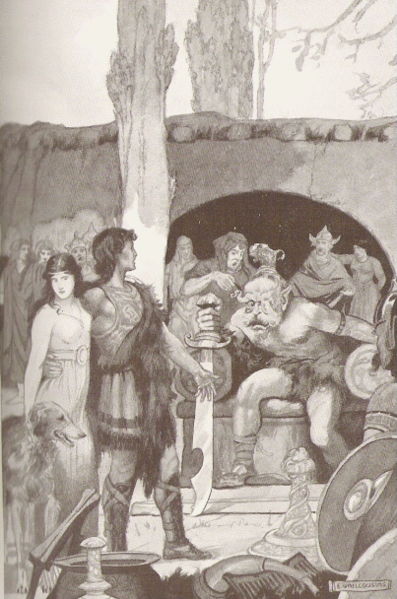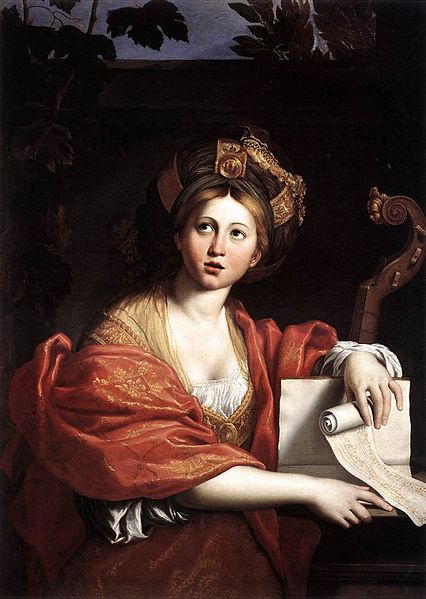
Illustration from King Arthur’s Knights: The Tales Retold for Boys and Girls (1911), by Walter Crane
Nimue is a sorceress known as the Lady of the Lake. In some stories, Merlin falls in love with her and becomes trapped by her magic. Nimue is also Lancelot’s protector and foster mother, and she gives the sword Excalibur to King Arthur and, many years later, helps to take him to Avalon when he’s dying.
Ninniane is the Old French form of Nimue. It may be derived from the Old Celtic male name Ninian, which in turn might ultimately come from the Brythonic name *Ninniau. Other forms include Ninniene, Niniane, Nyneve, Nymenche, Nimiane, Ninieve, Nivene, Niviène, Nivienne, Niviana, Niniame, Nymanne, Nimanne, Nynyane, Nenyve, Nyneue, Niniave, and Nynyue.

Merlin and Nimue (1861), by Edward Burne-Jones
Olwen means “white footprint” in Welsh, from roots ol (track, footprint) and gwen (white, blessed, fair). She’s one of the title characters of the Welsh epic Culhwch and Olwen. When Culhwch refuses to marry his stepsister, his stepmother curses him with the inability to marry anyone but Olwen. Though he’s never seen her, he falls in love with her. His father tells him he can only find Olwen with the help of his cousin King Arthur, who obligingly helps with the difficult search.
Orgeluse derives from the French word orgueilleuse (haughty). This is a character in Wolfram von Eschenbach’s 13th century romance Parzival. The name is spelt Orguelleuse in Chrétien de Troyes’s unfinished romance Perceval, the Story of the Grail.

Illustration of Culhwch and Olwen at the court of Olwen’s father Ysbaddaden, Celtic Myth & Legend (1905?), by Ernest Wallcousins
Palatyne, or Palentina, is one of the triplet sisters of water spirit Melusine. Their other sister is Melior. When their mortal father Elynas, King of Scotland, breaks his promise to not go into the bedchamber of his wife Pressyne while she’s giving birth, Pressyne leaves Scotland and raises her triplets in Avalon.
Qrainglaie is an Irish queen in Chretien de Troyes’s Les Merveilles de Rigomer.
Quebeleplus appears in Heinrich von dem Türlin’s Middle High German epic poem Diu Crône, which dates from about the 1220s.
Rathlean appears in the Irish romance Céilidhe Iosgaide Léithe (The Visit of Iosgaid Liath or Visit of the Grey-Hammed Lady). She’s the mother of Ailleann, who marries King Arthur when she takes him and the Knights of the Round Table to the Otherworld, and a granddaughter of the King of Iceland.

The Cumaean Sibyl (ca. 1617), by Domenichino
Sebile derives from the Greek word sibylla (sibyl). In Greco–Roman mythology, the sibyls (ten in number) are prophets and oracles. Sebile is a queen or princess who’s also a fairy or enchantress. She’s based on the Cumaean Sibyl, who presided over the oracle at Cumae, a Greek colony near modern-day Naples. According to legend, she lived a thousand years.
Soredamor is the lover of Alexander, a Knight of the Round Table, in Chrétien de Troyes’s epic poem Cligès (written about 1176). The Italian form is Sordamor.
Teleri is a contraction of the Welsh word ty (familiar “your”) and the name Eleri, which in turn derives from the name of a Welsh river. This river is also called the Leri. Teleri is a maidservant at King Arthur’s court in Culhwch and Olwen.

Sir Tristram and la Belle Ysoude drinking the love potion (1862–63), designed by Dante Gabriel Rossetti
Xenebra is the Galician form of Guinevere.
Ydain is the name of two characters. One is a maidservant at King Arthur’s court and a cousin of Gawain, who marries Sir Cador of Cornwall. The other is rescued from Sir Licoridon by Gawain and mutually falls in love with Gawain, then decides to dump him for another knight. In revenge, Gawain gives her to the dwarf Druidan.
Ygrayne is a form of Igraine (King Arthur’s mother) used in Sir Thomas Malory’s 15th century epic Le Morte d’Arthur.
Yseut is an Old French form of Iseult used in 12th century Norman–French poet Béroul’s Tristan. Another Old French form, Ysolt, is used by Thomas of Britain in a 12th century poem also called Tristan.









